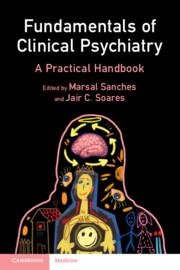Book contents
- Fundamentals of Clinical Psychiatry
- Reviews
- Fundamentals of Clinical Psychiatry
- Copyright page
- Contents
- Contributors
- Foreword
- Preface
- Chapter 1 Introduction
- Chapter 2 The Psychiatric Interview
- Chapter 3 Psychopathology and the Mental Status Examination
- Chapter 4 Classifications and the Diagnostic Process in Psychiatry
- Chapter 5 Neurobiology of Mental Disorders
- Chapter 6 Psychosocial Theories and Their Implications for Psychiatry
- Chapter 7 General Aspects of Psychopharmacology
- Chapter 8 Neurostimulation Treatments
- Chapter 9 Ethico-legal Considerations in Psychiatry
- Chapter 10 Transcultural Aspects of Mental Health Care
- Chapter 11 Child and Adolescent Psychiatry
- Chapter 12 Principles of Geriatric Psychiatry
- Chapter 13 Reproductive Psychiatry
- Chapter 14 Psychomotor Agitation
- Chapter 15 The Suicidal Patient
- Chapter 16 Depressive Disorders
- Chapter 17 Bipolar Disorders
- Chapter 18 Psychotic Disorders
- Chapter 19 Anxiety Disorders
- Chapter 20 Obsessive-Compulsive Disorder
- Chapter 21 Posttraumatic Stress Disorder
- Chapter 22 Borderline Personality Disorder
- Chapter 23 Antisocial Personality Disorder
- Chapter 24 Other Personality Disorders
- Chapter 25 Eating Disorders
- Chapter 26 Alcohol Use Disorder
- Chapter 27 Other Substance Use Disorders
- Chapter 28 Autistic Spectrum Disorders
- Chapter 29 Attention Deficit/Hyperactivity Disorder
- Chapter 30 Delirium and Other Medical Conditions Presenting with Psychiatric Symptoms
- Chapter 31 Dementia
- Chapter 32 Psychiatric Care of the Medical Patient
- Appendix
- Index
- References
Chapter 5 - Neurobiology of Mental Disorders
Published online by Cambridge University Press: 02 January 2025
- Fundamentals of Clinical Psychiatry
- Reviews
- Fundamentals of Clinical Psychiatry
- Copyright page
- Contents
- Contributors
- Foreword
- Preface
- Chapter 1 Introduction
- Chapter 2 The Psychiatric Interview
- Chapter 3 Psychopathology and the Mental Status Examination
- Chapter 4 Classifications and the Diagnostic Process in Psychiatry
- Chapter 5 Neurobiology of Mental Disorders
- Chapter 6 Psychosocial Theories and Their Implications for Psychiatry
- Chapter 7 General Aspects of Psychopharmacology
- Chapter 8 Neurostimulation Treatments
- Chapter 9 Ethico-legal Considerations in Psychiatry
- Chapter 10 Transcultural Aspects of Mental Health Care
- Chapter 11 Child and Adolescent Psychiatry
- Chapter 12 Principles of Geriatric Psychiatry
- Chapter 13 Reproductive Psychiatry
- Chapter 14 Psychomotor Agitation
- Chapter 15 The Suicidal Patient
- Chapter 16 Depressive Disorders
- Chapter 17 Bipolar Disorders
- Chapter 18 Psychotic Disorders
- Chapter 19 Anxiety Disorders
- Chapter 20 Obsessive-Compulsive Disorder
- Chapter 21 Posttraumatic Stress Disorder
- Chapter 22 Borderline Personality Disorder
- Chapter 23 Antisocial Personality Disorder
- Chapter 24 Other Personality Disorders
- Chapter 25 Eating Disorders
- Chapter 26 Alcohol Use Disorder
- Chapter 27 Other Substance Use Disorders
- Chapter 28 Autistic Spectrum Disorders
- Chapter 29 Attention Deficit/Hyperactivity Disorder
- Chapter 30 Delirium and Other Medical Conditions Presenting with Psychiatric Symptoms
- Chapter 31 Dementia
- Chapter 32 Psychiatric Care of the Medical Patient
- Appendix
- Index
- References
Summary
Psychiatric disorders are complex and multifaceted conditions that profoundly impact various aspects of an individual’s life. Although the neurobiology of these disorders is not fully understood, extensive research suggests intricate interactions between genetic factors, changes in brain structure, disruptions in neurotransmitter pathways, as well as environmental influence.
In the case of psychotic disorders, such as schizophrenia, strong genetic components have been identified as a key feature in the development of psychosis. Moreover, alterations in dopamine function and structural brain changes that result in volume loss seem to be pervasive in people affected by these disorders. Meanwhile, mood disorders, including major depressive disorder and bipolar disorder, are characterized by disruptions in neurotransmitter systems responsible for mood regulation, such as serotonin, norepinephrine, and dopamine. Anxiety and personality disorders also exhibit neurotransmitter dysfunction and neuroanatomical changes, in addition to showing a genetic overlap with mood and psychotic disorders.
Understanding the underlying mechanisms in the pathophysiology of these conditions is of paramount importance and involves integrating findings from various research areas, including at the molecular and cellular levels. This brief overview aims to highlight some of the important developments in our current understanding of psychiatric disorders. Future research should aim to incorporate a comprehensive approach to further unravel the complexity of these disorders and pave the way for targeted therapeutic strategies and effective treatments to improve the lives of individuals afflicted by them.
- Type
- Chapter
- Information
- Fundamentals of Clinical PsychiatryA Practical Handbook, pp. 27 - 38Publisher: Cambridge University PressPrint publication year: 2025

